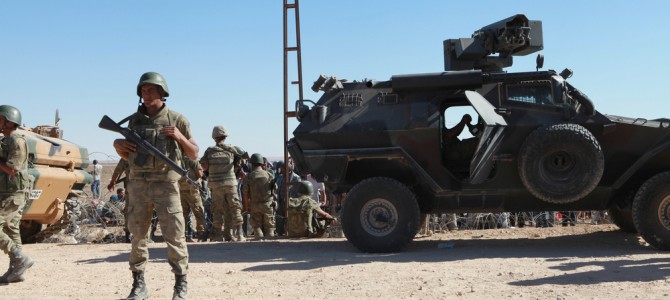
In September 2010, “I visited the troops in Ramadi, the scene of some of the most vicious fighting of the war.
“The reporters accompanying me asked if the war had been ‘worth it,’ and I responded – in ‘markedly anti-triumphal remarks,’ as they would write – that while our troops had accomplished something really quite extraordinary here, how it all weighs in the balance I think remains to be seen.
“It really requires a historian’s perspective in terms of what happens here in the long run.” —Robert F. Gates, former U.S. Secretary of Defense, “Duty.”
The long run has ended. We are losing the war in Iraq for the same reason we lost the war in Vietnam: we are fighting one war, while the insurgents fight another. In both campaigns, we understood neither our enemy nor our friends. In both campaigns, American lives and treasure were thrown into a fight we could not win. So, in both campaigns, we didn’t.
The actions of the Iraqi Army in Ramadi—fleeing at the first sign of trouble—are uncomfortably familiar. Again, our allies fail. Again, our allies ensure American lives in more than a decade of active war were lost in vain. Again, we leave holding a handful of ashes.
Dinar in the Dark
French academic Bernard Fall remains the most nuanced and intuitive observer of insurgent movements, devoting his life to study of such movements in Indochina until his death on Vietnam’s “Street Without Joy” in February 1967. Fall taught that insurgency is at its core a revolutionary movement, fought in support of a unifying doctrine, using guerrilla tactics combined with political action. He was convinced that control of a country revolved around the ability of a force—whether a standing government, a government in waiting, or an insurgent force in the shadows—to tax its citizens.
Collecting tax indicates strength and legitimacy. The loss of such ability, whether rapid or subtly slow, indicates a lack of control. Without the ability to tax, the government is not viewed as legitimate; “without being widely accepted as legitimate, the government is unlikely to survive a determined insurgency.”
The reverse is also true: whoever can collect tax is the government, even if not in name. In Iraq, that is ISIS. RAND Corporation last month published findings that ISIS collects over $1 million a day in tax and extortion payments across Iraq. That’s $600 million total and climbing, more than they collect from stolen bank assets, ransoms, or oil theft. If you live in Ramadi, you answer to ISIS. If you live in Baghdad, you soon will.
With Friends Like These
“Iraqi forces just showed no will to fight,” Ashton Carter, U.S. Secretary of Defense, May 24, 2015.
“The ISF was not driven out of Ramadi. They drove out of Ramadi,” Gen. Martin Dempsey, chairman of the Joint Chiefs of Staff, May 24, 2015.
“Be glad to trade ya some ARVN rifles! Never been fired, and only dropped once!” Private Cowboy, “Full Metal Jacket.”
There is nothing quite so startling, and refreshing, inside the Pentagon as when the most senior officials say out loud what everyone knows. Ash Carter and General Dempsey, to their great credit—and to the unanimous acclaim of the people who work for them—refused to walk back these quotes. In the Washington press corps, the quotes above are called a “gaffe.” In the regular world, they are called “the truth.”
The Iraqi soldiers of today look an awful lot like the South Vietnamese soldiers of 50 years ago. This average soldier is a conscript, either de facto or de jure, fleeing a wasteland of poverty and low-level corruption in the countryside or urban slums. These young men are either dragooned into service or reaching for their only way out of poverty—a distinction without a difference. Such a young soldier is likely illiterate, innumerate, and incapable of following the most basic of orders due to either incompetence or self-preservation.
These soldiers are ripe for threat or bribery. This inchoate army has loyalty to the Americans by necessity, but is tied closer to the opponents by religion, ethnicity, tribe, family, clan, or language. As an endemic problem to a field force, rampant desertion is superseded only by the individual soldier’s instinct to break and run at the first threat of mortality at the hands of a faceless, remorseless, and determined enemy. Thus does an army decay from the inside out. This is how Iraq will fall.
Iraq Sounds Awfully Familiar
In Iraq, as it was in Vietnam, the military officers of real talent and courage ended up one of two ways: commanding praetorian guards focused on protecting the leader in the capital city; or executed, due to their sheer competence and leadership skill, which caused the regime to view them as threats. Upon seizing power 36 years ago, Saddam Hussein purged hundreds of his leaders, forcing those who wished to remain with him to execute, by their own hand, the others. On such terror is a tyrant to power borne. Through such actions are young officers taught their first brutal lesson: loyalty is not to country, but to crown.
In the absence of good officers, the average soldier’s lot falls to the junior varsity of the officer corps, a cadre rife with low-level criminality, corruption, and incompetence, suffering from the disdain of its generals. The generals in both these wars did not have commands—they had satrapies, fiefdoms allowing them to abuse and ignore their troops. They demand that American lives be the only ones at risk, fall back at the first gunshots, and call on Americans to help, then blame Americans for defeats, as indeed the Iraqis are now doing.
They do not share in the sacrifices of their soldiers. One South Vietnamese general pointed out that the whole point of being an officer is not having to live in the field. Self-preservation—and enrichment—is to these men more important than winning.
Here is the rub: these generals are our only ticket out. We cling to the desperate, pathetic belief that their army will, someday, stand on its own. These men will not fight. We know it. They know it. ISIS damn sure knows it. That is why they are there.
The Insurgents Who Win
An insurgent succeeds because he has a sanctuary: the Ho Chi Minh Trail through Laos and Cambodia provided the North Vietnamese Army and Viet Cong a secure, safe lifeline of supplies from North to South; the Federally Administered Tribal Areas border region between Afghanistan and Pakistan hides Taliban and al-Qaeda in friendly defiles. In Iraq, ISIS has a sanctuary right out in the open, in the villages and slums they control through intimidation and in which government forces are afraid to patrol.
Sanctuary means guerrilla forces can move swiftly, literally light on their feet, for not having to carry rations and ammunition with them, and figuratively agile and supported emotionally and spiritually by brothers in arms. Sanctuary also has deeper meaning: by not having one place they value above another, the insurgent does not provide a center of gravity that a conventional force could attack. This means the Americans have nothing to shoot at. With nothing to shoot at, we do not know what to do. We put a very few, very specialized operators on the ground, launch drones and attack jets, and hope that we hit something worth killing.
In contrast to America’s “allies,” enemy forces in Vietnam were and in Iraq are willing to fight and die for belief and honor, and this grit and determination make them impossible to destroy. Militarily, the Viet Minh, Viet Cong, North Vietnamese Army, Taliban, al-Qaeda, and ISIS are the embodiment of tough, seasoned field warriors. They are physically strong, stoic, lean, well-trained, and motivated by a cause greater than themselves. They are led by the bold, men who want to fight, men who live hard for months in the field, and fight and die alongside their soldiers. These men, all of them, will kill and die for a cause.
They view themselves not as soldiers, but as warriors and defenders of greater honor, driven by the desire for something better for their country. Whether this was a united Vietnam, or an Afghanistan free of infidels, or a Khoresan in which all Muslims would live under the words of Mohammed, such driving, compelling desire will always outweigh the mercenary instincts of those he fights—those to whom the United States are allied.
Insurgents in campaigns like these are the nationalists, the true believers, the religious authentics. The freedom fighter trails the whiff of authenticity and romance: the young warrior, living off the land, willing to die for cause and country. This draws to his flag young men looking for adventure. A Viet Cong operator wanted to unite his partitioned country. A Taliban fighter wants to rule Afghanistan. An ISIS fighter wants an Islamist kingdom. These messages make sense to the locals. And if the message does not resonate, threats and murder certainly do.
The End Game
In asymmetric war, the insurgent wins by not losing, while the United States loses by not winning. The insurgent, using murder and control of the night, employs terror, persuasion, and religious zealotry as the means to a larger end: unifying his people, imposing his will, collecting tax to fund his cause. Americans make promises, inject hundreds of billions into leaky government coffers, drop bombs, sacrifice men. The Americans want to leave. The insurgent is staying until he dies or wins. This makes him unstoppable.
ISIS does not have to defeat the Iraqis. ISIS, just as al-Qaeda and the Taliban maneuvering right now on the other side of Iran, has only to wait out the Americans. They know the airstrikes will end. They know we will not put Americans back on the ground.
We now know what happened in Iraq in the long run. It is clear to Carter, Dempsey, and every American general, and every soldier and Marine and intelligence analyst and diplomat. The bad guys are winning. We cannot know when they have won. But we will know when we have lost.









